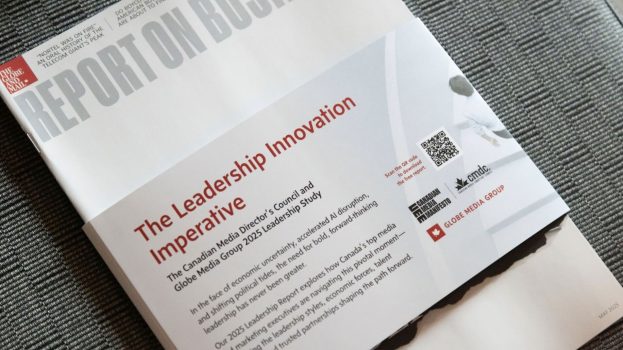A precedent-setting decision by an Ontario judge ruling that the Mr. Submarine sandwich shop chain has to pay twice for commercials aired on Toronto’s cfto-tv in 1989 means the established relationships among media, advertisers and their agencies can no longer be taken for granted.
Ontario Court General Division judge Madame Justice Kathryn Feldman ordered Mr. Submarine to pay cfto more than $62,000 in damages for spots aired in the fall of 1989 despite the fact the sandwich chain had already paid to its agency, Deane Advertising (now defunct), for the commercial air-time.
In the Nov. 19 ruling issued in Toronto, Judge Feldman found that a 1987 agreement between Deane and Mr. Submarine made the latter company responsible for the air-time booked on the station, the flagship of Baton Broadcasting.
Strategy phone calls to Mr. Submarine were not returned.
A spokesman for the Canadian Association of Broadcasters says the case is being studied.
An ad agency in Toronto, thought to be Raymond Deane’s last employer, says Deane does not work there.
To reach the more than $62,000 damages, Judge Feldman decided cfto should absorb half its more than $88,000 loss for the two months’ air-time in question during which the broadcaster failed to notify Mr. Submarine it had not been paid.
Mr. Submarine also had to pay almost $18,000 for a third month of commercials.
Joe Garwood, executive vice-president and chief operating officer at Baton, says cfto pursued the matter in court because some basic principles of responsibility among broadcasters, advertisers and their agencies had to be established.
Garwood says it was never a question of cfto seeking to place anyone in jeopardy or to antagonize its customers.
Rather, says Garwood, the decision ‘established very important principles as to what the rules are.’
Marilyn Field-Marsham, the lawyer who represented cfto, agrees the decision was precedent-setting, noting that save for a case in New Brunswick, there was nothing similar in Canadian jurisprudence.
Looking outside Canada, Field-Marsham says in England it is accepted an agency acts a principal, and in the u.s., in most cases, agencies are considered agents of advertisers.
Until this lawsuit, it was usual for debts to be written off and the loss entered in the experience column.
Despite the adjudication of this case, buying time or space in Canada’s $8 billion to $10 billion a year media industry remains full of uncertainties.
Bob Reaume, vice-president, marketing, at the Association of Canadian Advertisers, says the aca’s lawyers have not yet seen the 24-page legal ruling in the case, but he suggests it does not solve or even clarify the matter of dual liability.
Reaume says the only precedent set is that which makes it incumbent upon broadcasters to inform advertisers their agencies are behind with media payments, noting no evidence on ‘the custom of the trade’ was presented in court.
Peter Swain, president of Media Buying Services in Toronto, says dual liability is a major issue which the media industry allowed to ‘lie fallow’ for a year, only to have it return front and centre with this case.
Swain empathizes with cfto’s position, but suggests broadcasters are doing nothing to help their situation.
To support his view, he notes a case where twice in one year he turned down advertisers whose creditworthiness did not meet mbs’ standards.
However, Swain says, the advertisers ignored the rebuff and went directly to a broadcaster which accepted their bookings.
As well, Swain says it is not just some of the smaller shops which give broadcasters pause, some of the financially troubled multinational agencies have, too.
One media source, who declined to be identified, also wants to know where agencies turn when faced with bankrupt clients.
The Phil Givner carpet discount chain in Toronto and the retail arm of J. Walter Thompson is a case in point, the source says.
John Sinclair, president of the Institute of Canadian Advertising, says it is unlikely the cfto-Mr. Submarine case could happen in 1993.
Sinclair, who points out Deane Advertising was not a member of the ica, says the cfto situation came about three years before the ica and its members began telling broadcasters their printed contracts were unacceptable to ad agency and advertiser alike.
Sinclair says the ica tells its members to amend contracts with a rubber stamp or sticker stating the agency is wholly responsible for paying the broadcasters, so eliminating dual liability.
Peter Kretz, general manager of marketing and sales at cbc tv in Toronto, sees the Mr. Submarine case as one of money management.
‘I think it’s a financial control point,’ says Kretz, echoing what many suggest may be needed to remedy the situation.
Peter Holmes, senior partner and creative director at Franklin Dallas Advertising in Toronto, agrees.
Holmes cautions agencies not ‘to cash-flow their business off media dollars,’ a practice several sources say may happen, with one of them suggesting if agencies do use media money as a float, it is the larger shops which benefit.
The larger shops, says the source, are under less scrutiny than smaller agencies and are more able to ‘string along’ (delay paying) media providers.
Sinclair does not agree.
He says the use of media dollars as an agency float is a practice that happened at some shops in the 1980s and before, but has ceased.
Swain says one way the industry might deal with the issue of who is ultimately responsible for paying what would be a ‘new standard of accreditation for agencies.’
He suggests three separate billings at $100,000 each as a benchmark.
Sinclair believes stricter credit controls by the media providers would help the situation, as would ‘staying on top of receivables.’
Reaume says an ‘audit clause’ in contracts is an option, as is, of course, calling the association.
At least one of the largest advertisers in the country has a sweeping audit clause in its contracts.
The clause allows the advertiser to conduct random audits of its agency’s books to ensure media money is being forwarded appropriately rather than used as what one executive calls ‘their American Express.’
Despite its apparent attraction, Garwood does not believe direct dealing – advertisers bypassing agencies and paying media directly – will increase as the result of Judge Feldman’s ruling, nor does Sinclair, who points out 75% of national advertising goes through agencies.























